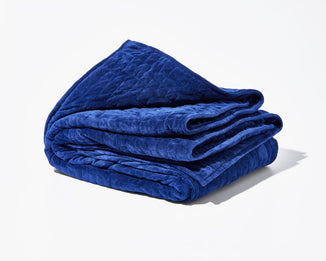
Aug 19, 2022
A Complete Guide on How to Go to Bed Early

At some point, almost everyone wants to know how to go to bed early. Maybe you started a new job that forces you to rise with (or before) the sun, and your new working hours are now at odds with your night owl tendencies. Perhaps you've made a habit of sleeping late and wish to correct the problem before your sleep hygiene gets out of control. Regardless of your situation, one thing is clear — you need to hit the hay early or risk missing out on precious Zzzs.
For night owls and sleep procrastinators, getting on an early bird schedule can seem daunting. But don’t let the thought of going to bed early fill you with dread. With the right bedtime products — hello, plush weighted robes — and a few tips from the team at Gravity Blankets, moving up your bedtime is easier than you might think!
Benefits of an Early Bedtime
Shifting your sleep time earlier by just 60 minutes can provide many benefits, from reducing your risk of depression and diabetes to making your daily commute safer. That’s why you don’t want to make a habit of burning the midnight oil or binge-watching your favorite shows into the wee hours of the night. Here’s why going to bed early is well worth the effort.
- An early bedtime makes you happier. People who stay up late tend to be crankier in the morning because they’re not getting the recommended amount of shut-eye they need. But the effects of a poor night’s sleep go beyond morning irritability. Evidence also suggests that people with earlier sleep times have a lower risk of becoming clinically depressed.
- An early bedtime could make you less stressed at night. Feeling anxious at night? Time to reset your sleep schedule. According to some scientists, the timing of when you go to bed might make it more difficult to banish nighttime worries. A study published in Cognitive Therapy and Research found that people who put off bedtime until later and slept for shorter periods were more likely to experience negative, ruminating thoughts at night than those whose bedtimes skewed earlier.
- An early bedtime is associated with better heart health. Did you know that the time you climb into bed at night can affect your cardiovascular health? According to a UK study, falling asleep after midnight is associated with a 25 percent higher risk of developing heart disease. Researchers say that night owls may not see as much morning light, which plays an important role in maintaining our circadian rhythms.
- An early bedtime could mean a safer commute. Hitting the hay early is especially important if you need to hop in the car and drive somewhere first thing in the morning. Although driving drowsy may seem harmless, experts say that it can be just as dangerous as driving intoxicated. Even one night of poor sleep can impair your reaction time and increase your risk of getting into an accident.
- An early bedtime can boost your body’s immune response. Does it feel like you’re always getting sick? Your night owl tendencies may be to blame. According to researchers from the University of Texas Southwestern Medical Center, crawling into bed at a late hour can impair immune function by throwing off your circadian rhythms, the internal body clocks that drive the sleep-wake cycle and many other aspects of human physiology. One possible explanation could be that the so-called “clock genes” controlling our circadian rhythms are closely connected to certain immune cells.
Prepping for Your New Bedtime
If your “go to bed early” game plan consists of diving under the covers and anxiously waiting for the Sandman to arrive, you might want to rethink your strategy. Forcing yourself to go to bed when you aren’t tired is never a good idea. That’s because hitting the sack while feeling totally wired can cause you to associate your bed with wakefulness, diminishing your ability to fall asleep at a decent hour.

So, how do you train yourself to go to bed early?
First, accept that shifting your bedtime earlier is not an overnight process. For a smooth transition, start moving your bedtime in 15- to 30-minute increments. For example, if you normally fall asleep at 1:30 a.m., you’d aim for 1:00 a.m., then 12:30 a.m. and so on until you reach your desired bedtime.
Once you’ve mapped out your bedtime for the next few days (or weeks), you can start seeking out products and tools that will help you wind down for bed and fall asleep at your desired bedtime. In the next section, we’ll share some of our favorite sleep products and tips — from optimizing your bedroom for sleep to banishing nighttime worries with weighted blankets and other weighted products.
How to Go to Bed Early: 9 Tried-and-True Tips
If you want to adopt a healthier sleep schedule, try these science-backed tips for shifting your bedtime forward.

1. Exercise in the Morning or Afternoon – If you’re not a morning person, you’re probably not a morning workout person either. But hear us out. Research suggests that scheduling a sweat session for 7 a.m. may help shift your body clock to an earlier schedule, meaning your body will naturally want to go to bed earlier in the evening. And because you’re falling asleep earlier, you’ll feel more alert the next morning. In other words, your morning workouts will get easier the more you do them.
2. Lighten Up Your Mornings – Soak in natural sunlight as soon as possible after waking up. Daylight has a powerful influence on your circadian rhythms, helping to synchronize our sleep patterns. Specifically, light exposure tells our brain to suppress the sleep hormone melatonin for approximately 14 hours. So, the earlier you expose yourself to morning sunlight, the more likely you’ll feel tired when your desired bedtime rolls around.
3. Limit Stimulants – Drinking caffeine late in the afternoon might get you through boring meetings and turn around tasks with tight deadlines, but it's probably not helping you get to bed at a decent hour. Caffeine activates your central nervous system, making you feel alert even when you’re ready for sleep — and the effects can last for four hours or longer. To prevent caffeine-related sleep issues, cut yourself off by 2 p.m. or earlier if you’re particularly sensitive to caffeine’s effects. Instead, take a brisk walk to perk yourself up and overcome the afternoon slump.
4. Unwind for Bed Peacefully – Creating a relaxing bedtime routine is one of the smartest things you can do for your sleep and overall health. Many adults have trouble switching off their busy thoughts at night, leading to restless sleep. By engaging in relaxing activities a couple of hours before bedtime, you can help your unsettled mind and body transition to sleep. So, why not take a warm bath, for instance, or read a book? You can also utilize weighted products, such as weighted eye masks, robes and blankets, which are known to ease stress before bed and improve sleep quality.
5. Put Away Your Devices – Sleep doctors have been telling us to ditch electronics before bed for years, and with good reason. The blue light emitted from laptops, smartphones and other electronic screens can suppress melatonin production, making it difficult to feel sleepy at your desired bedtime. Plus, the apps on your devices keep your brain engaged. If you want to fall asleep at warp speed, avoid digital devices at least an hour before bedtime and ban them from the bedroom entirely.
6. Chill Out – Ever notice how you sleep more soundly in the winter than in the summer? Research has shown that we sleep better in a cooler room. That’s because our core body temperature drops when we should be heading to bed. So, if you want to fall asleep earlier, try lowering the thermostat by a few degrees a few hours before bedtime. Most studies have found that a temperature between 60 and 67 degrees Fahrenheit is the sweet spot for deep sleep. If you're a hot sleeper, try swapping out your heat-trapping bedding for cooling and moisture-wicking options — like our cooling weighted blanket. It's made from 100 percent premium cooling Lyocell to help keep you cool and sweat-free all night long!
Get Your Cooling Weighted Blanket
7. Eat an Early Dinner – Are you starting to notice a pattern? Like exercise and light exposure, mealtimes directly affect your circadian rhythms. By shifting your mealtimes forward by an hour or so, you can trick your brain into feeling tired at your desired bedtime. For example, if you’re aiming to go to bed at nine o’clock, try to finish eating dinner before six. Also, pay special attention to the types of food you eat for dinner. To set yourself up for a refreshing night’s rest, avoid spicy, oily, sugary or fried foods before bedtime.
8. Drink Some Herbal Tea – Herbal teas have long been studied for their many purported health benefits, particularly their ability to promote relaxation and sleep. Genuine herbal teas are naturally caffeine-free, making them a great option day or night. But if your body needs a little extra help preparing itself for bed, turning to sleep-inducing bedtime teas is a great place to start. For a calmer night’s rest, look for blends containing chamomile, valerian and passionflower.
9. Create a Comfortable Sleeping Environment – The bedroom should be a relaxing sanctuary, regardless of when you hit the sack. First, make sure your bedroom is dark and quiet. If you live on a noisy street or have inconsiderate housemates, consider using a white noise machine to block out sound. Avoid raising your stress levels by keeping your bedroom clutter-free. Filling your sleeping environment with certain scents, like lavender and vanilla, can also be calming and help your brain pick up the cue that it’s time for bed.

When Should I Go to Bed?
If you want to improve your overall health — and your heart health in particular — aim for a bedtime between 8 p.m. and midnight. According to researchers, this bedtime is ideal for most people because it is less likely to disrupt the body’s circadian rhythms. (Dysregulated circadian rhythms can lead to a host of adverse health consequences, including premature death, cancer, reproductive problems and metabolic diseases.)
Of course, not everyone can adhere to this particular bedtime. If you work a job that falls outside traditional hours (i.e., 9-5), you may need to sleep at odd hours to achieve the recommended seven to nine hours of shut-eye. If rearranging your schedule so you can sleep more at night isn’t possible, your best bet is to practice good sleep hygiene. Ideally, you should try to follow a consistent sleep routine — even on your days off.
It's also worth mentioning that there can be such a thing as going to bed too early. For instance, if you slept poorly the night before, you might be sorely tempted to slip under the covers a few hours early and call it a night. But this could further derail your sleep schedule, making your sleep troubles even worse. In this case, you might be better off drinking a little caffeine in the late morning/early afternoon to stay awake until your normal bedtime.
Consistency Is Key
Once you’ve successfully trained your body to fall asleep at an earlier bedtime, you’ll want to do your best to stick to it — even on the weekends. Beyond lowering your risk for various health problems (diabetes, cardiovascular disease, etc.), maintaining a consistent sleep schedule helps reinforce your circadian rhythms, making it easier for you to fall asleep at the same time every night.
Image Credits:
Stock-Asso/Shutterstock.com
hero mujahid/Shutterstock.com
Mix and Match Studio/Shutterstock.com
Your use of this website, its content, and any products obtained through this website is at your own risk. This website, its content, and any products obtained through this website are provided on an “as is” basis, without any warranties of any kind, either express or implied, including warranties of merchantability, infringement of intellectual property, or fitness for any particular purposes. No warranty or representation is made with respect to the completeness, reliability, quality, or accuracy of this website or its content. This website, its content, and any products obtained through this website do not constitute medical treatment and is not a substitute for a medical examination or diagnosis. If you are dealing with a health condition check with your health care provider before using. This website may contain affiliate links that allow us to earn a commission on purchases made through such links. We may accept forms of advertising or sponsorships in connection with this website. There might also be paid topic insertions. We may accept and keep free products, services, and other forms of compensation from others.



